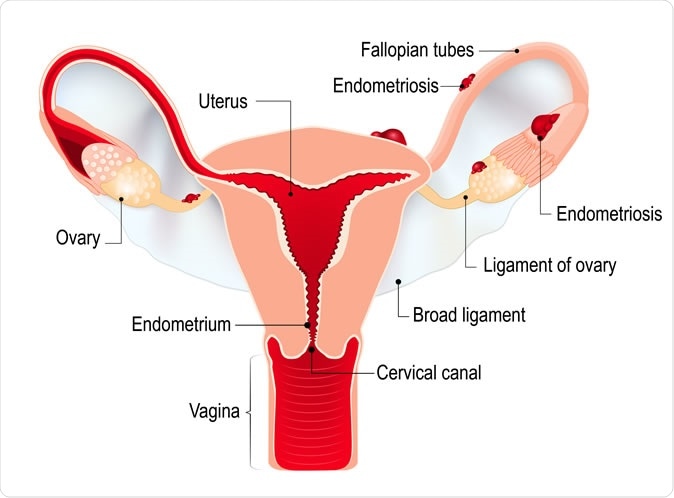
Image Credit: Africa Studio / Shutterstock
In the largest study into the condition, the researchers found that around half of the participants said they experienced suicidal thoughts. The BBC study also reports that women with the condition describe the pain as like hot knives stabbing through the body, with sensations of twisting and stretching.
Some women with the condition experience painful periods, so severe that it has affected their lives, education, career, and relationships. The researchers acquired data by letting women fill up a questionnaire on how the condition has impacted them. With the help of Endometriosis UK, they collected and collated the responses.

Endometriosis. Illustration Credit: Designua / Shutterstock
Endometriosis negatively impacts women’s lives
Most of the respondents said that endometriosis had impacted on their education, they rely on prescription painkillers each month, including potentially-addictive opioids, and about half of the women verbalized that they had experienced suicidal thoughts.
“This shocking new research is a stark reminder that both society and the NHS need to wake up and accept that endometriosis is a chronic condition that cannot be brushed under the carpet,” Emma Cox, from the Endometriosis UK, said.
“Endometriosis affects over 1.5 million women in the UK, and the impact it can have on all aspects of a person’s life – both physically and mentally - must be recognized. Currently, the diagnosis time for endometriosis is an unacceptable 7.5 years on average; this must come down,” she added.
The alarming results of the study has warranted the government to act. Following the publication of the study, the MPs plan to conduct an inquiry to help the patients with the condition and determine how it affects the lives of women in the United Kingdom.
The Endometriosis UK emphasizes that endometriosis can negatively impact the lives of women, both physically and mentally. Further research is needed to lessen the diagnosis time, and allow women to have better access to proper pain management.
“Having a physical illness significantly increases our chances of having poor mental health. Living in constant pain and struggling with daily life, with relationships, with conception and with work add to the burden for women living with endometriosis,” Sarah Hughes, Centre for Mental Health Chief Executive, said.
“Women living with endometriosis deserve support for their mental health as well as for the condition itself and its many effects on a woman’s life. Health services need to wake up to the hidden and unspoken emotional pain too many women experience without the help they need to manage such a poorly understood and distressing condition,” she added.
What is endometriosis?
Endometriosis is a reproductive condition wherein the tissue that normally lines the uterus or womb, grows outside of the uterus. Endometriosis is estimated to affect an estimated one in 10 women during their reproductive age.
In the United States, an estimated 11 percent of American women between the age of 15 and 44 are living with endometriosis. Across the globe, endometriosis affects approximately 176 million women in the world. Dubbed as an invisible illness, the condition’s primary symptoms are pain and infertility.
The other symptoms of the condition include pain during sexual intercourse, painful and debilitating menstrual cramps, pain in the lower abdomen, heavy menstrual periods, bleeding in between periods, and painful bowel movements or urination during menstrual periods. Some women may experience fatigue and weakness.